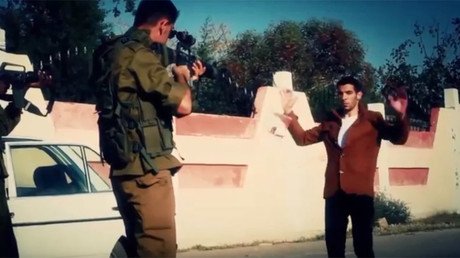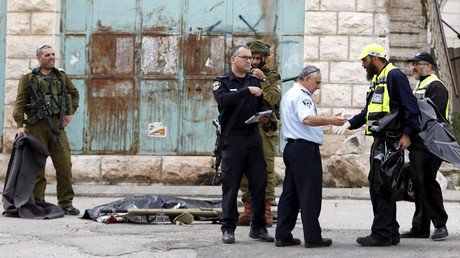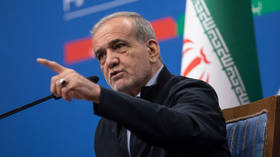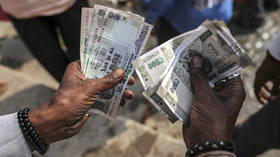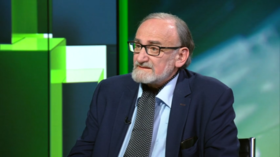‘Extrajudicial execution’ by Israeli soldier downgraded to manslaughter by military tribunal
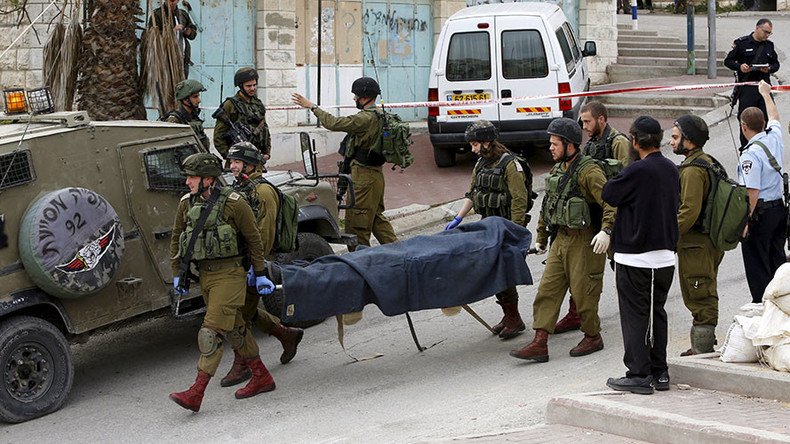
An Israeli military tribunal has softened charges against IDF soldier accused of killing an already wounded Palestinian attacker from murder to manslaughter. The UN meanwhile called the deadly shooting a “a clear case of an extrajudicial execution.”
The shooting of the young Palestinian, 21-year-old Abed al-Fatah al-Sharif, accused of stabbing another Israeli soldier minutes earlier, was caught on camera. Footage emerged via the B’Tselem human rights center. It featured one of the soldiers reloading his weapon and firing a headshot at the motionless victim lying on the ground.
Prosecution to seek charge of manslaughter, not murder in soldier shooting https://t.co/4A5XikDO7t
— The Times of Israel (@TimesofIsrael) March 31, 2016
The defendant claimed he had been acting in self-defense believing that the 21-year-old attacker, Abed Fatah al-Sharif, had been wearing a suicide belt. However other soldiers present at the scene of the crime challenged the defendant’s claim, with one witness citing the soldier as saying that “terrorist was alive and he deserved to die” before he pulled the trigger.
Speaking in court on Thursday, prosecutor Lt Col Edoram Rigler used that quote to argue that it was the defendant's indirect confession to the crime.
“These quotes contain no claims of a life threatening situation, and show the suspect’s motives and his mood in real time. As we know the suspect’s version [of a life-threatening situation] developed at a later stage,” Rigler said in court, according to Haaretz.
After numerous court hearing into the fatal incident this week, Rigler announced Thursday that the tribunal were reducing the charges from murder to manslaughter.
As the Israeli public remains split over the incident, Rigler added that the prosecution felt confident it would secure a conviction.
“The soldier is suspected of shooting deliberately and without need from an operational standpoint while the terrorist lay on the ground after the same terrorist had previously been shot by IDF soldiers,” Riegler said, adding that there no need for self-defense based on review of the video footage.
Manslaughter charges in Israel imply that the murder was intentional but not a premeditated killing. The premeditated killing of a person has a mandatory punishment of life imprisonment, while manslaughter cases face a maximum sentence of 20 years behind bars. More deliberations are scheduled on Friday.
The tribunal’s decision to lower the charges comes after United Nations special rapporteur Christof Heyns on Wednesday called the fatal accident an “extrajudicial execution”.
“Whatever legal regime one applies to the case, shooting someone who is no longer a threat is murder,” said Heynes. “The images shown carry all the signs of a clear case of an extrajudicial execution.”
Haaretz reporter Gideon Levy told RT that while he was already “disappointed” that the tribunal decided to drop the murder charges for the Hebron suspect, he fears that the soldier’s charges maybe reduced even further amid pressure from “nationalistic, racist” majority fraction of Israeli society.
“I'm still very suspicious about the intentions of the military justice system, and I think that at the end of the day, it will not even be those charges, it will be much more ridiculous than this,” Levy said, adding that the charges can be reduced even further, to “misusing of weapons,” or “violation of fire opening orders,” which carry a much milder prison term.
“Anyone who is conscience, who has watched the video, cannot come to any other conclusion, but [that] this was a murder, cold-blood[ed] murder of the wounded, helpless Palestinian,” Levy said. “Shooting him in the head in this situation was a cold blood murder.”
The Haaretz reporter told RT that the case “cannot be underestimated,” as it will serve as precedent for IDF soldiers’ conduct in future in terms of what is permitted under the rules of engagement.
“If this soldier will not be severely punished, this means soldiers can continue to execute ‘Palestinian terrorists.’ This is unacceptable in any democracy,” Levy concluded.
Ahmad Tibi, an Arab-Muslim Israeli politician and leader of the Arab Movement for Change, an Arab party in Israel, told Haaretz he blamed Prime Minister Benjamin Netanyahu for influencing the tribunal's decision.
“This is a soldier who is a murderer, who perpetrated a criminal act in plain view in the video. And the decision influenced by the remarks of the prime minister, who asked to take into account the soldier's family, shows again how such cases must be investigated by an international tribunal as war crimes,” Tibi said.
IDF reducing charge from murder to manslaughter for soldier who shot wounded… https://t.co/0H6MbEu5M3#IsraelNewspic.twitter.com/RoVlCQ3NNv
— The Jerusalem Post (@Jerusalem_Post) March 31, 2016
Israeli society remains split over the incident with the majority of Israelis supporting the IDF soldier. Some 57 percent of Israelis said there was no need to arrest the soldier or launch an investigation, revealed the poll, conducted for Israel’s Channel 2. Over 40 percent of those polled deemed the soldier's actions ‘responsible’. Only 5 percent described the shooting as ‘murder’.
